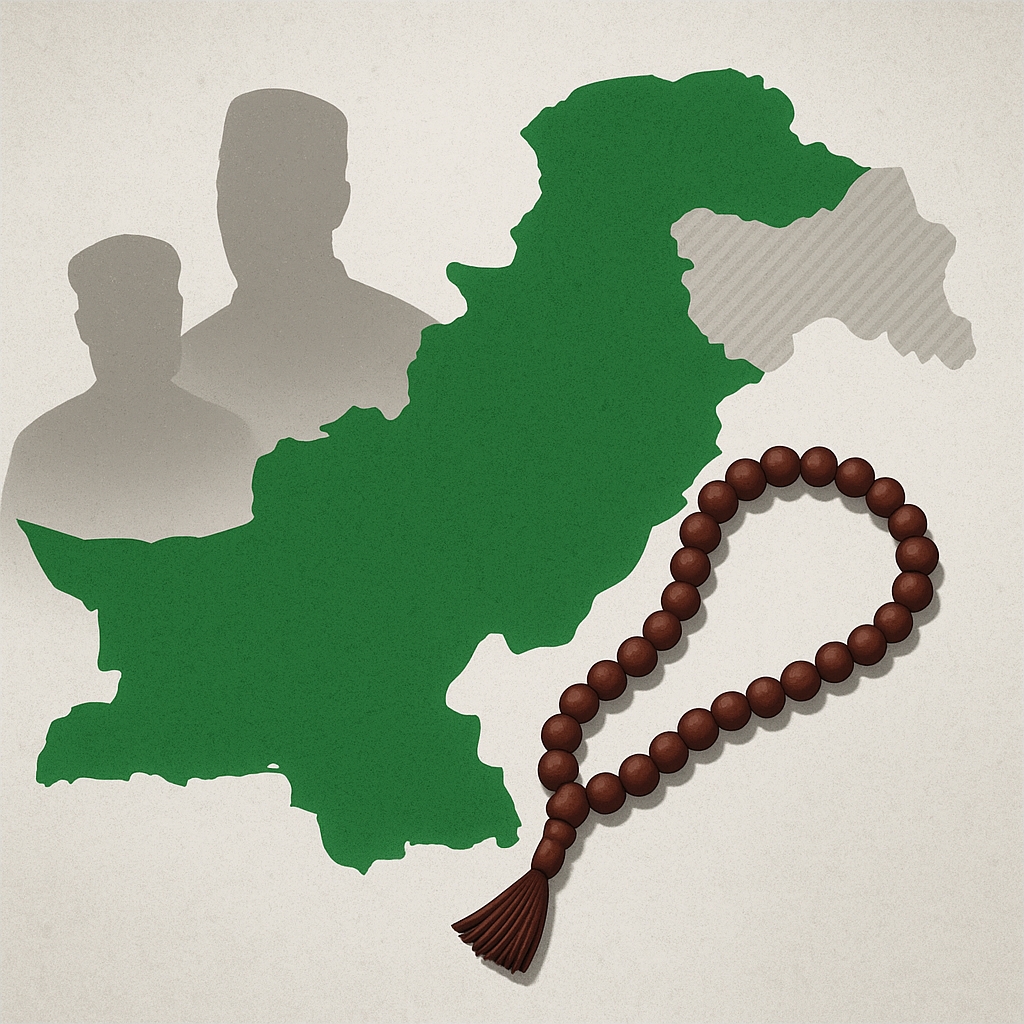Faith as a Tool of Power: The Manipulation of Religious and Politico-Religious Parties in Pakistan
Unity – Faith – Discipline: The Foundation of Pakistan’s Strength
In August 1947, Pakistan emerged as an independent nation, born from resilience, hope, and determination. At the heart of this journey stood three guiding principles given by Quaid-e-Azam Muhammad Ali Jinnah: Unity, Faith, and Discipline. These timeless values are not just part of our history; they remain essential for shaping our future.
Unity – The Power of Standing Together
Unity was the backbone of the freedom movement. People from different regions, languages, and cultures came together with a shared vision — an independent homeland. This unity was not about erasing differences, but about embracing them under one national identity.
Today, unity still matters. Political divisions, cultural differences, and economic challenges can only be overcome if we work as one nation. From community service to national projects, unity remains our most powerful tool for progress.
Faith – The Strength to Endure
Faith gave people the courage to face hardship. The journey to independence was filled with sacrifices, but the unwavering belief in a better future kept the dream alive.
Faith is more than religion — it is trust in our purpose, our people, and our potential. In modern Pakistan, faith means believing in our ability to grow, innovate, and stand strong on the global stage.
Discipline – The Key to Success
Quaid-e-Azam often reminded us that discipline is essential for any nation’s success. The struggle for Pakistan required organized action, strategic planning, and personal responsibility.
Today, discipline can be seen in how we follow laws, respect time, and commit to excellence in our work. Without discipline, even the greatest plans fail. With it, we can turn vision into reality.
Part I: The Persistent Shadow of Political Manipulation
Faith as a tool of power, since the inception of Pakistan, religion has remained both its moral compass and its political paradox. Born in the name of Islam, the state was envisioned by its founder as a homeland where Muslims could live freely, shape their destiny, and model governance on justice, equality, and accountability before God. Yet, over time, this very sacred foundation became a tool for political manipulation.
A widespread perception exists, not without reason, that religious and politico-religious parties in Pakistan have often served as extensions or instruments of state intelligence agencies. They have been deployed to shape political narratives, control opposition, neutralize popular movements, and divide national opinion. In this intricate web, religion, the heart of the nation’s identity, has been both weaponized and diluted.
This paper seeks to verify, analyze, and document that perception. It examines the historical evolution of religious politics, the calculated use of Islam during key military regimes, particularly General Zia-ul-Haq’s era, and the operational role of intelligence agencies in managing religious forces for political ends. The paper then evaluates the consequences of such manipulation and offers a roadmap for reclaiming faith from the machinery of power.
Part II: The Evolution of Religious Politics in Pakistan
Early Foundations and Political Marginalization
The Pakistan Movement followed a political process that was largely pragmatic, though profoundly Islamic in its moral purpose. The Muslim League, led by Muhammad Ali Jinnah, was a political, not clerical, movement. Religious leaders of that period were divided: many from Jamiat Ulema-e-Hind opposed partition, while others like Shabbir Ahmad Usmani supported it. After independence, religious parties faced a dilemma, whether to play the role of moral custodians or political contestants.
By the early 1950s, Jamaat-e-Islami (JI) under Abul Ala Maududi and Jamiat Ulema-e-Islam (JUI) began to assert political roles, demanding Islamization of the state. Yet, their electoral success remained marginal. Despite their limited vote bank, these parties wielded influence far beyond their numbers, primarily through their capacity to mobilize street power and their alignment with state objectives at crucial junctures.
The 1953 Anti-Ahmadi Movement — An Early Test Case
One of the first documented instances of religious agitation being politically manipulated was the 1953 anti-Ahmadi movement in Punjab. It was ostensibly a spontaneous religious uprising but, in reality, was shaped by political rivalries and bureaucratic intrigue. The state’s subsequent crackdown under martial law exposed the vulnerability of religious mobilization and simultaneously revealed its potential as a controllable tool of influence.¹
From that point forward, the state learned a lasting lesson: religion could be invoked to unite, to distract, and to divide, all depending on need.
Part III: “Islamization” as Statecraft — Myth, Selectivity, and Control
Redefining Islamization
The term Islamization has been used so frequently in Pakistan’s political vocabulary that it has lost much of its sanctity. In practice, it has often signified not the moral and structural transformation of society, but rather the tactical use of Islamic symbols, laws, and rhetoric to gain legitimacy or suppress dissent.
The Zia Regime and the Instrumentalization of Faith
General Zia-ul-Haq’s period (1977–1988) epitomizes selective Islamization. Having overthrown an elected government, Zia faced a profound legitimacy crisis. To justify military rule, he presented himself as Ameer-ul-Momineen — a moral restorer of the Islamic order. His Hudood Ordinances (1979), Zakat and Ushr laws, and Shariat Benches created a religious façade for his rule. Yet, these reforms were selective and symbolic.
Interest-based banking continued under new names like mark-up and profit-and-loss sharing without structural change. The feudal elite remained unchallenged, and Western alliances, particularly with the U.S. during the Afghan Jihad, flourished despite Islam’s injunctions against political subservience to non-Muslim powers.
Islamization thus became a political currency rather than a divine calling. It shaped public morality selectively — imposing corporal punishments on the weak, while absolving the powerful. ²
The Intelligence Dimension
During Zia’s rule, Pakistan’s intelligence agencies, particularly the ISI, underwent major expansion. The Afghan Jihad became a theatre of ideology and geopolitics. To rally domestic support, agencies cultivated religious parties and clerics, presenting jihad as a religious obligation. This network of seminaries and militant training centers created a generation of ideologically conditioned proxies, loyal to their sponsors rather than independent religious principles.³
This was the genesis of what later came to be known as strategic Islam, the use of religion as a policy instrument.
Selective Morality and Political Expediency
Zia’s Islamization glorified external piety, public prayer, fasting, moral policing, while leaving untouched the deeper ethical foundations of justice, accountability, and economic fairness. The judiciary remained submissive; the poor bore the brunt of Hudood punishments; and corruption continued behind religious slogans.
The result was a culture of hypocrisy, a gap between outward religiosity and inward decay. Many clerics became instruments of the regime, serving as moral cover for political repression. Those who resisted, such as Maulana Abdul Haq (Akhundzada), were silenced or sidelined.⁴
Enduring Legacy
Zia’s model entrenched the intelligence-religious nexus into Pakistan’s statecraft. Future regimes, civilian or military, inherited a ready toolkit: use religious parties to neutralize opposition, divide political alliances, and simulate legitimacy. The moral wound of selective Islamization still festers in Pakistan’s soul, a reminder of how easily sacred ideals can be sacrificed for temporal power.
Part IV: Intelligence Agencies and Political Engineering — Case Studies and Evidence
The 1988 Islami Jamhoori Ittehad (IJI)
Following Zia’s death, the ISI under Lt Gen Hameed Gul engineered the Islami Jamhoori Ittehad (IJI), a coalition of right-wing and religious parties — to counter Benazir Bhutto’s PPP. Funds were distributed among political candidates through covert channels, later confirmed in the Asghar Khan Case (2012). ⁵ The IJI served its purpose: it fragmented the democratic vote, prevented a PPP majority, and perpetuated military tutelage over civilian politics.
The Afghan and Kashmir Jihads
During the 1980s and 1990s, intelligence patronage of religious militancy deepened. Groups such as Hizb-e-Islami, Harkat-ul-Mujahideen, and later Lashkar-e-Taiba and Jaish-e-Muhammad were supported as “strategic assets” to project power regionally.⁶ Domestically, this policy legitimized extremism under the guise of patriotism. The line between religious resistance and state-sponsored militancy blurred, a confusion that continues to haunt Pakistan today.
Manipulation During Civilian Eras
Even democratic regimes inherited the same manipulative reflex. Religious parties were alternately empowered and suppressed, depending on political expediency. In 2002, during General Musharraf’s rule, the Muttahida Majlis-e-Amal (MMA), a coalition of religious parties, emerged with tacit establishment support. ⁷ It provided moral legitimacy to Musharraf’s military rule by endorsing his Legal Framework Order in exchange for political space in Khyber Pakhtunkhwa and Balochistan.
The pattern was unmistakable: religious parties served as pressure valves, diversions, and instruments of state control.
Part V: Consequences — The Price of Manipulating Faith
Erosion of Religious Credibility
When religion becomes a tool of power, its moral authority erodes. The public begins to view clerics and religious parties as opportunists rather than guides. The resulting cynicism damages not only the credibility of religious leadership but also faith itself — turning Islam from a unifying moral code into a fractured political ideology.
Sectarian Fragmentation
State patronage of select religious groups fueled sectarian polarization. Shia-Sunni conflicts in the 1980s and 1990s, often fanned by regional rivalries between Iran and Saudi Arabia, were compounded by local intelligence games. Thousands perished in tit-for-tat killings, and Pakistan’s social fabric was permanently scarred. ⁸
Intellectual Stagnation and Moral Confusion
Selective Islamization discouraged critical religious scholarship. Faith was reduced to slogans; jurisprudence replaced philosophy; rituals replaced reflection. The result was an ideological vacuum, a generation of Muslims emotionally religious but intellectually unanchored, vulnerable to both manipulation and despair.
Political Paralysis
By using religion as a control mechanism, the state weakened both democracy and faith-based reform. True Islamic governance, built on Adl (justice) and Shura (consultation), never took root. The people were kept divided between secularists and pseudo-religious loyalists, ensuring no unified challenge to the entrenched elite.
International Isolation
Externally, the nexus of religion and intelligence has damaged Pakistan’s image. Western powers, while complicit during the Afghan war, later turned accusatory, branding Pakistan a hub of extremism. Meanwhile, genuine religious scholars who could project Islam’s moral beauty were overshadowed by radical or politicised voices.
Part VI: The Way Forward — Reclaiming Faith from Power
If Pakistan is to heal, it must disentangle Islam from political engineering and intelligence manipulation. The following steps are essential:
- Depoliticise Faith: The state must end covert funding or patronage of any religious party. Islam should inform the constitution and education, not electoral tactics.
- Intellectual Revival: Encourage authentic Islamic scholarship rooted in Quranic ethics, justice, and reasoning (Ijtihad).
- Transparent Governance: Faith-based values must translate into accountability, not moral posturing. Leaders should demonstrate Islam by conduct, not slogans.
- Reform of Intelligence Mandate: Agencies must return to their constitutional domains. Domestic political manipulation, whether through clerics or media, should be criminalised.
- National Reorientation: Revive the moral vision of Pakistan, not as a fortress of religiosity, but as a sanctuary of justice, compassion, and dignity for all.
Conclusion
Religion is the soul of Pakistan, but that soul has long been trapped between statecraft and sanctimony. When intelligence agencies and political elites turn Islam into an instrument of convenience, they rob the nation of its spiritual depth and moral unity.
As Allama Iqbal warned, “The ultimate aim of the Muslim is not to dominate others but to master himself.” Pakistan’s rebirth lies not in new slogans, but in rediscovering the sincerity of purpose that animated its creation. Faith must return to the people, free from manipulation, guided by conscience, and anchored in truth. Only then will Pakistan fulfill its divine and historical mission.
Footnotes
-
Munir Report, Court of Inquiry into the Punjab Disturbances of 1953 (Government of Pakistan, 1954).
-
Zia-ul-Haq, Islamization of Laws in Pakistan: Speeches and Statements, 1978–1988.
-
Steve Coll, Ghost Wars: The Secret History of the CIA, Afghanistan, and Bin Laden (Penguin, 2004).
-
K.K. Aziz, The Murder of History in Pakistan (Lahore: Vanguard, 1993).
-
Supreme Court of Pakistan, Asghar Khan Case Judgment, 2012.
-
Ahmed Rashid, Descent into Chaos: The United States and the Failure of Nation Building in Pakistan, Afghanistan, and Central Asia (Viking, 2008).
-
Hasan Askari Rizvi, Military, State and Society in Pakistan (Palgrave Macmillan, 2000).
-
Vali Nasr, The Shia Revival: How Conflicts within Islam Will Shape the Future (W.W. Norton, 2006).


